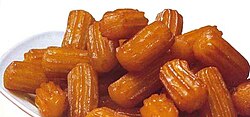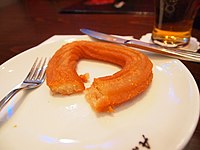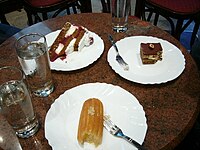Tulumba
This article needs additional citations for verification. (June 2019) |
 Tulumba | |
| Alternative names | balah ash-sham (Arabic: بلح الشام) |
|---|---|
| Type | Dessert |
| Place of origin | Iran |
| Region or state | Countries of the former Ottoman Empire, Balkans, Middle East, South Caucasus |
| Main ingredients | Flour, butter, salt, water, syrup, vanilla extract |
Tulumba or Bamiyeh (Persian: بامیه) is a deep-fried dessert found in Turkey and the regional cuisines of the former Ottoman Empire. It is a fried batter soaked in syrup, similar to jalebis and churros. It is made from unleavened dough lump (about 3 cm long) given a small ovoid shape with ridges along it using a pastry bag or cookie press with a suitable end piece. It is first deep-fried to golden colour and then sugar-sweet syrup is poured over it when still hot. It is eaten cold.
Name[]
Tulumba literally means 'pump' in Turkish from Italian: tromba. The dessert is called pomba in Cypriot Greek and bombacık in Cypriot Turkish. In Armenian cuisine it may be called either pomp or tulumba (Armenian: թուլումբա). Tulumba features in Albanian, Serbian, Bosnian, Bulgarian, Macedonian, Greek (Greek: τουλούμπα), Azeri (Azerbaijani: Ballıbadı) and Turkish cuisines. The sweet is also found in Persian cuisine as bamiyeh (Persian: باميه). In Hejazi it is called ṭurumba (Arabic: طُرُمْبَة) directly from Italian: tromba, but in Egyptian and some Arab cuisines it is called balaḥ ash-Shām (Arabic: بلح الشام), literally "Syrian dates" or "Damascene dates," though the name may have come from "şambali", another Turkish dessert (the "Şam" in "şambali" corresponding to "Shām" in "balaḥ ash-Shām" and both referring to Damascus). In Iraqi cuisine it is known as datli (Arabic: داطلي), directly coming from Turkish word tatlı.
Main ingredients[]
It is made from a yogurt[citation needed] and starch based dough, which is fried before being dipped in syrup. It is a special sweet often enjoyed at Iftar in Ramadan.[1] It is also commonly served with its counterpart, the jalebi, which is prepared the same way, but the only difference is that it has a web-like arrangement consisting of strips of dough.
Gallery[]
Tulumba

Tulumba

Tulumba with kaymak and pistachio
Tulumba cross-section (front)

Twisted round tulumba
See also[]
- List of doughnut varieties
- List of fried dough varieties
- List of Turkish desserts
- Bamiyeh
- Churro
- Jalebi
- Lokma
- Fartura (food)
References[]
- ^ "Muslims break fast on first day of Ramadan". USA Today. Associated Press. November 4, 2005. Retrieved August 19, 2010.
External links[]
 Media related to Tulumba at Wikimedia Commons
Media related to Tulumba at Wikimedia Commons
- Doughnuts
- Ottoman cuisine
- Arab cuisine
- Iranian pastries
- Iftar foods
- Turkish desserts
- Jewish desserts
- Israeli desserts
- Balkan cuisine
- Persian Jewish cuisine
- Sephardi Jewish cuisine
- Albanian cuisine
- Turkish cuisine stubs
- Jewish cuisine stubs
- Dessert stubs





